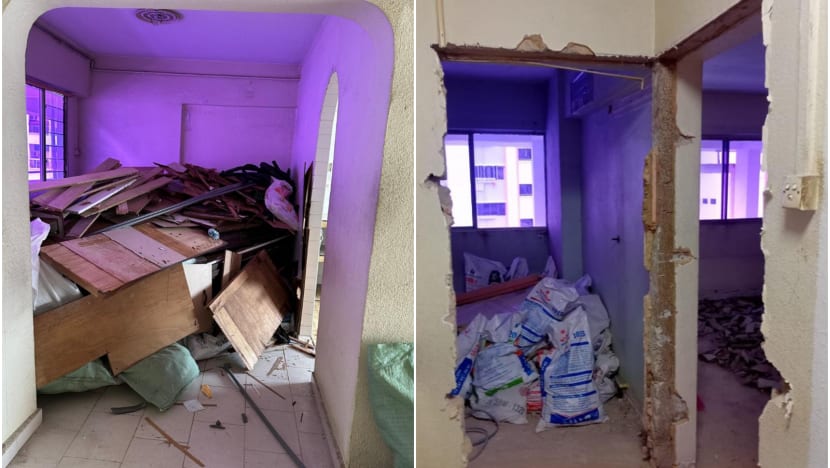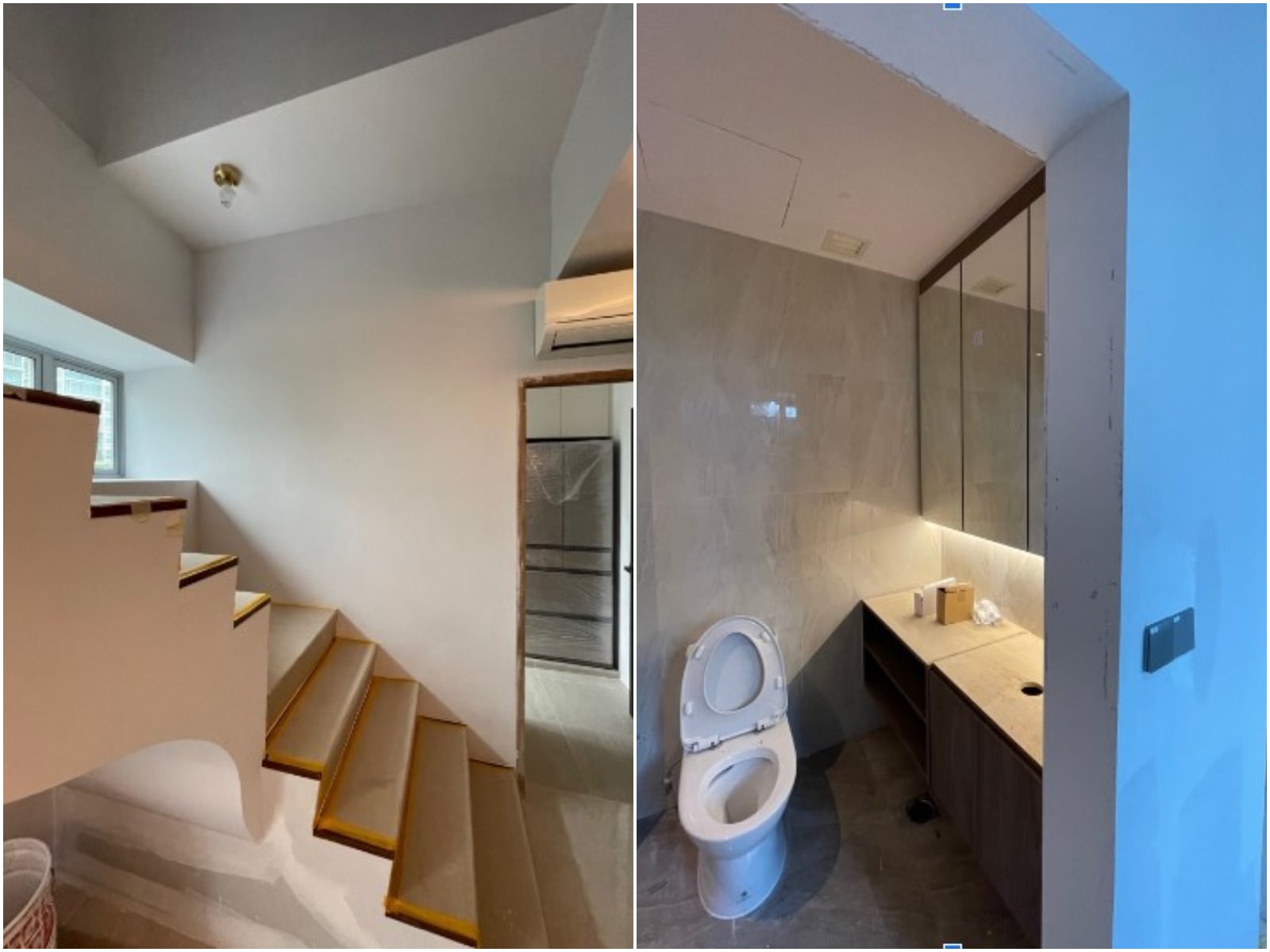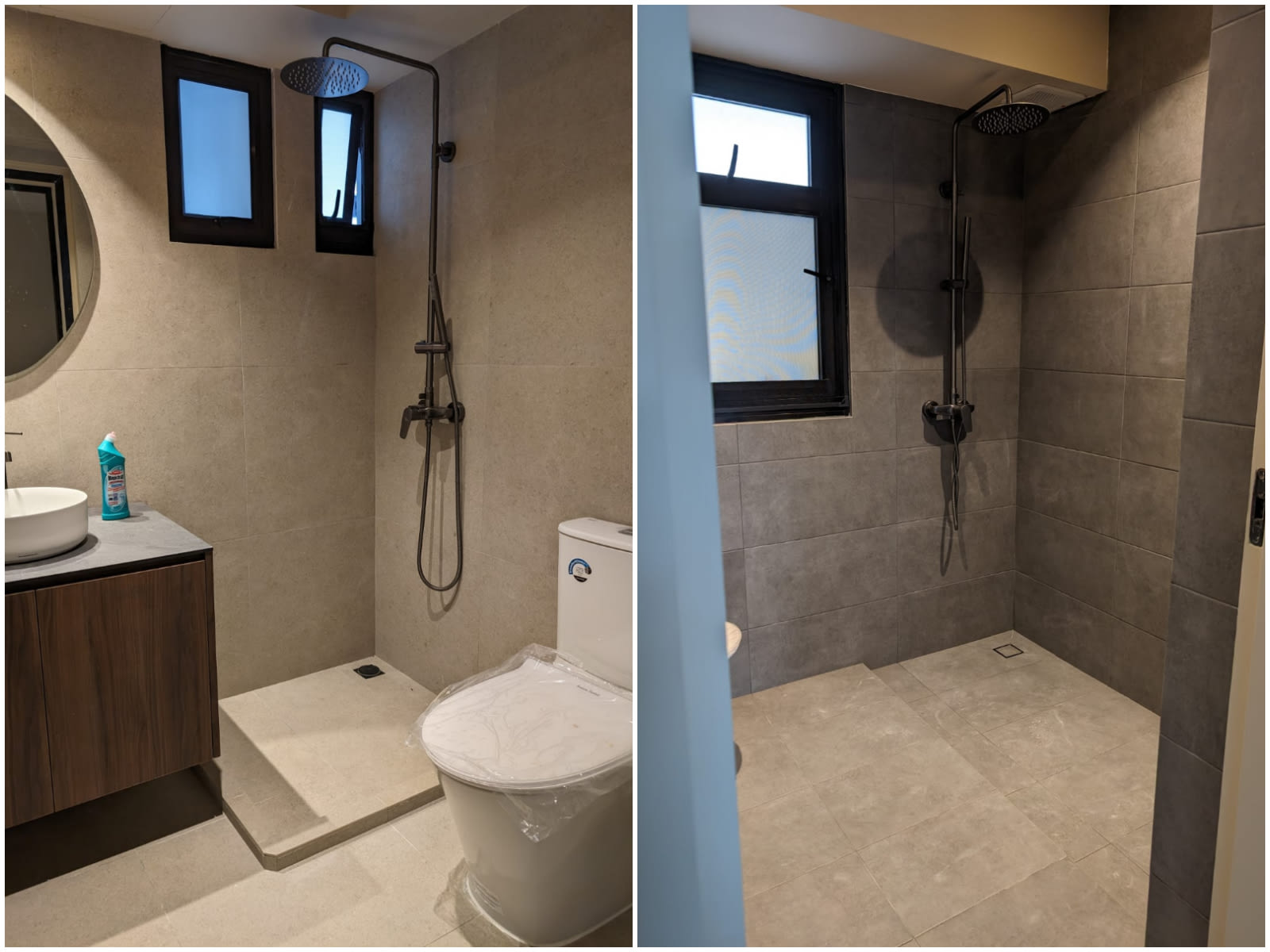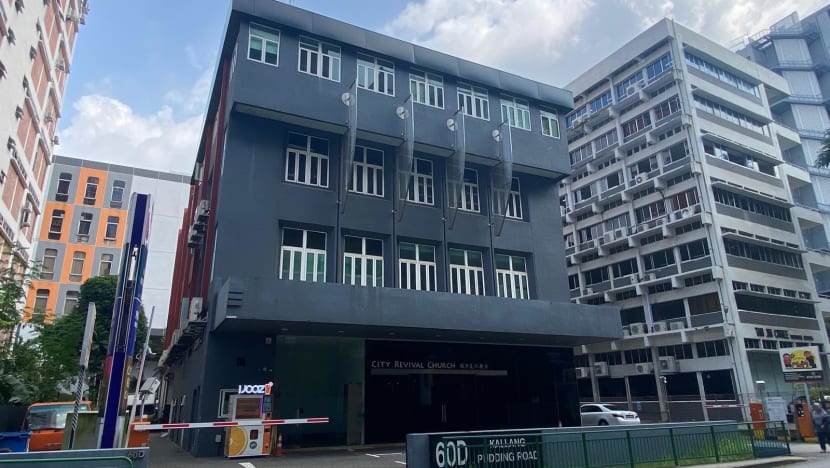Multiple legal claims filed against interior design firm for unfinished homes, overdue payments
At least three home owners, one sub-contractor and a former employee have obtained orders from the Small Claims Tribunals against interior design firm Formal Informal Practice over incomplete renovation projects, overdue payments and unpaid wages.

Maisonette owner Douglas Lin is one of the home owners demanding a refund from interior design firm Formal Informal Practice for delays in renovation works. (Photos: Douglas Lin)

This audio is generated by an AI tool.
SINGAPORE: After months of shopping around for interior designers, Mr Calvin Ho and Ms Melissa Tan finally found one they liked and were looking forward to celebrating Chinese New Year in their new home.
They signed a contract in October 2022 with interior design firm Formal Informal Practice, which they said had unique designs.
But nearly two years on, Mr Ho and Ms Tan still have not been able to move into their home. Hiccups occurred soon after the contract was signed, with the firm making mistakes taking measurements and the designer overseeing their renovation abruptly leaving the project.
The project then went through the hands of two more designers before the firm’s director – Aden Amos Seow – took over in September last year.
But months rolled by and their home was still not ready. Tired of the delays and constantly chasing for updates, the couple sought help from the Consumer Association of Singapore (CASE) in mid-January this year. The consumer watchdog told them there was little it could do as Mr Seow did not respond to any of its emails and calls.
That was also when Mr Seow “ghosted” the couple. WhatsApp screenshots showed no response from Mr Seow for nearly two months.
“We are both outstationed most of the time … that’s why we chose to pay a premium for (an interior designer),” said Mr Ho. “In the end, it felt like a nightmare.”
The couple decided to pursue legal action to claim their money back from the firm and have been awarded a court judgment for nearly S$75,000 (US$56,000).
CNA also spoke to other home owners who faced delays and unfinished homes despite making partial or close to full payments to Formal Informal Practice. Two of them were granted orders from the Small Claims Tribunals for refunds of around S$7,500 and S$20,000, while the third home owner did not file a claim with the tribunal as the refund he is asking for exceeds the claim limit of S$30,000.
Another home owner Fang Wenkai, who was also granted a Small Claims Tribunal order, is asking for his S$8,424 payment back after the firm provided incomplete designs and raised the quotation by S$18,000.
CNA has seen and verified the orders.
But Formal Informal Practice has not complied with the orders, said those interviewed, adding that Mr Seow did not show up for any of the tribunal consultations or hearings.
“If you can’t enforce the order, what you're left with is a piece of paper that you can frame up in your home as memorabilia,” said Mr Fang.
The police have confirmed that multiple reports have been filed against the company and that investigations are ongoing.

CASE said it received five complaints against Formal Informal Practice in the last year about delays in the completion of renovation projects.
The firm’s director, Mr Seow, has denied most of the complaints, telling CNA they are “not entirely true”.
Formal Informal Practice, also known as Formal Informal Office Pte Ltd, is still listed as a “live” company on Accounting and Corporate Regulatory Authority (ACRA).
Mr Seow said the firm is no longer in operation and he moved out of the company’s listed address in February.
“WE WERE ALWAYS UNSURE OF WHAT WAS BEING DONE”
Home owners who spoke to CNA said they checked online reviews and ACRA’s website before they hired Formal Informal Practice.
Mr Kelvin Goh bought a business profile from ACRA that showed the firm having S$1 million in paid-up capital. “We felt the paid-up capital was pretty substantial,” he said.
First-time home owners Cindy Yong and Timothy Tan recalled having to chase Mr Seow for project schedules, so they could arrange for home appliances to be delivered and installed.
“I rescheduled the deliveries so many times … I also changed our deep cleaning appointment to the point that the cleaning company wanted to refund us our deposit,” Ms Yong said.
“It was always a ‘we will get back to you’ … We paid promptly whenever they requested, yet we were always unsure of what was being done.”
The firm also offered to help with furniture orders from Chinese e-commerce site Taobao but did not provide a receipt months after receiving payment. Ms Yong and Mr Tan requested a refund but never got their money back.
Home owners CNA spoke to also complained of shoddy work, from wrongly placed switches to faulty cabinets, as well as air-conditioning units that were mistakenly removed.
When these were left unfixed, home owners said they had no choice but to hire others to finish the job. Formal Informal Practice refused to refund the additional costs, they said.

The renovation delays have been especially stressful for maisonette owner Douglas Lin, who was to undergo a kidney transplant and needed a place to recuperate.
Over three months, the only renovation work done in his home was the hacking of “three walls”. Piles of debris were also left uncleared despite repeated requests, Mr Lin said.
By then, he had paid the firm nearly S$92,000, which included design fees and a 50 per cent deposit requested by the firm before work started.
Mr Lin asked Mr Seow to provide a “recovery plan” for his home. When no updates were provided a week later, he demanded a full refund.
CONTRACTORS, EMPLOYEES NOT PAID
CNA also spoke to two sub-contractors and a former employee who have not been paid. These sums fall between S$1,000 and S$9,200.
Formal Informal Practice has been ordered by the Small Claims and Employment Claims tribunals to pay one of the sub-contractors and the employee. The other sub-contractor did not file a legal claim.
The employee, who spoke to CNA on condition of anonymity, said the firm did not pay up despite the tribunal’s order.
The Tripartite Alliance for Dispute Management (TADM) said as of Aug 8, it has assisted two former employees from Formal Informal Practice on their claims for unpaid salaries with the Employment Claims Tribunals, but the firm has "failed to comply".
TADM then helped one employee obtain financial assistance from its short-term relief fund. The other employee’s case is pending assessment, said a joint reply from the Manpower Ministry and TADM in response to queries from CNA.
The two sub-contractors – Classic Furniture Design & Renovation Works and micro cement supplier Jiu Ding Sheng – said they only received down payments. Both firms were unable to get hold of Mr Seow for the remaining payment after work was done.
Classic Furniture was granted a money order of around S$9,200 from the Small Claims Tribunals. Even then, it all came to naught.
“Does it mean that people can don’t pay and nothing will happen to them? In this case, people like us … are not protected at all,” said a spokesperson from Classic Furniture.
As of end-July, 11 claims have been filed against Formal Informal Practice by customers, sub-contractors and ex-employees. All of them were granted money orders, the court's system showed.
ALLEGATIONS “NOT ENTIRELY TRUE”: FIRM DIRECTOR
When contacted, Mr Seow claimed that he has “never not paid any of (his) staff”.
“I can only say on one employee, I still do owe her CPF (Central Provident Fund) but that’s about it,” he told CNA.
He acknowledged the delays and incompletion of clients’ renovation projects but said his firm did carry out the works.
In Mr Lin’s case, hacking works at the maisonette had been completed. This is why he could not accede to the home owner’s request for a full refund.
He said that he was willing to work out a partial refund, but this was turned down by Mr Lin. Mr Seow admitted he has not been in touch with Mr Lin as the home owner “seems to not be very receptive” to what he had to say.
Mr Seow blamed “scheduling” issues with external contractors and the company’s own “cash flow issue” for the delays.
Asked why the firm faced cash flow problems, he said he was paying some of his employees “high” commissions, but did not provide specific numbers.
“I didn’t foresee that it would start to take a toll on my company’s finances,” he said.
Mr Seow also denied being uncontactable and claimed he has been “making restitutions” to contractors in instalments.
“I have already stopped operations but I haven’t dissolved the entity, mainly because I will only dissolve it after all of them have been paid.”
On why he did not attend the sessions at the Small Claims Tribunals, he said: “I had a lot on my plate. I was trying to sort out a lot of outstanding invoices so I was quite packed with trying to close more deals for these (cash flow issues).
“Actually, at that point in time, I said ‘If you want to find me, you can just come down to my office’ … because I did mention to them that even if we were to go to the legal route, if I don’t have the means to, there is nothing I can do.”
When CNA visited his office, the lights were off and the mailbox displayed a name card bearing the name of a different interior design firm.
Contractors and home owners who visited the office in recent months also could not find Mr Seow. Classic Furniture said it was told by people at the office unit that Mr Seow had moved out.
Mr Seow later let on that he had moved out of the firm’s office in February.

CALL FOR MORE CONSUMER PROTECTION
The entire experience has left those affected questioning if there is any recourse for them.
Enforcing the Small Claims Tribunal order would require him to spend more time and money on legal fees, said Mr Goh, a home owner who was awarded a money order of S$20,200 on Jul 18.
Lawyer Nicolas Tang said the tribunal can “only go so far as to decide who is in the wrong and which party ought to compensate another”.
“Simply put, the order is a paper judgment and therefore even if a party is successful in the claim, the other side may be unwilling to comply with the order,” said the managing director of Farallon Law.
Mr Tang said claimants may enforce the orders themselves by drafting and filing court papers, although most would hire lawyers to help with the process.
If the other party still refuses to pay up, claimants “can try to wind up the company or make the respondent (or) individual bankrupt by going to court”. In both scenarios, the debtor must owe at least S$15,000 and be unable to repay the amount, said Mr Tang.
“Even if consumers are successful, they would not be able to obtain full recovery of the legal costs they incurred,” the lawyer said.
Those interviewed hope that by speaking out, they can warn others of potential pitfalls in the industry.
They also hope their ordeal would bring about stricter regulations in the renovation industry, as well as more effective safeguards and recourse for consumers and businesses that are owed money.
For example, renovation firms could be required to set up escrow accounts for customers’ monies – a practice already in place in industries such as banking and finance, they suggested.
For Mr Ho and Ms Tan, they have since hired a new contractor and hope to finally move in this year.
“It’s been too long,” said Mr Ho. "Hopefully, I’ll be at my new place next Chinese New Year.”



















